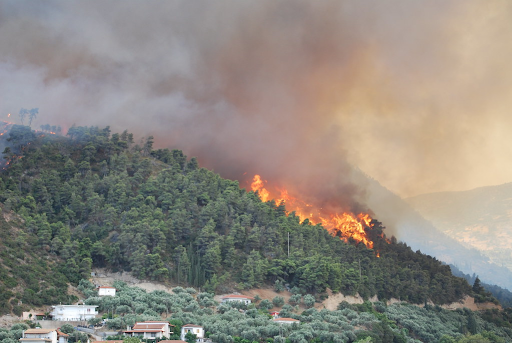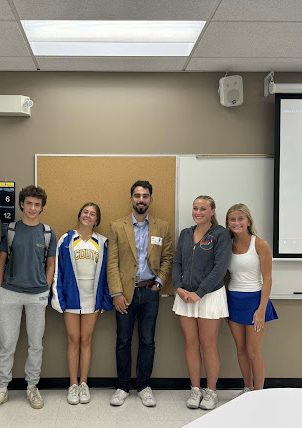The Mediterranean country Greece has officially become a “climate hotspot” in Europe. The increasingly warm temperatures, especially in the months of June and July, are leaving residents and tourists in fatal conditions.
With lack of rainfall, the heat has also led to an increase in forest fires, therefore creating long-lasting effects on the environment. As the country loses hope, George Gemelas searches for an answer.
On Friday Sept. 6th, Gemelas made a guest speaker appearance at the LFHS Hellenic Club. He is co-founder of The Axios Project and also created a documentary on Greece’s climate change.
Gemelas says The Axios Project aims to “strike in the here and now.” The goal is to gain attention and support from the Greek-American community to make a global impact on this adversity.
Gemelas went to undergraduate and graduate school at Yale University where he received his Masters Degree in Environmental Management. However, he was not always interested in the climate.
In college, he started as a Global Affairs major, but switched when he took a class called “Trees” while studying abroad in Turkey. This class was ultimately what inspired him to take on a new career path.
As a Greek man who visits the country often, he grew curious about the relationship between Greece and environmental disasters, leading him to dive deeper into the issue.
Forest Fires:

When Gemelas was at the Hellenic Club, he showed his short film to the group. It started with him in Evia, Greece, back in 2021 as he observed the effects of climate change on the country.
Fires filled the skies and the people of Greece said that their “livelihood was gone” because of it. Locals in the film would also describe the fires as causing “darkness during the day” due to the heavy clouds and smoke. At one point, there were over 80 forest fires in Rhodes, Greece, forcing many people to leave their homes.
Heat Waves:

“There are many things that lead to the start of a fire,” said Gemelas. “Someone could intentionally set it or accidentally set it, but the heat in Greece is what’s making it out of control.”
Since Greece is considered a “climate hotspot,” all effects of climate change occur faster. Because Greece warms so quickly, the land becomes dryer, leading to an increase in fires. The wind is also what carries these fires all around the country.
“The people in Greece understand what’s happening and all they want to do is put out the fires to save their country,” Gemelas said.
Agriculture Failing:

Greece relies on their olive oil as a huge source of income as it is one of their top five exports.
“In 2022, I saw the yield of olive oil fall to 50%,” said Gemelas.
The year before that, the yield had dropped 20%. Every year that the climate worsens in Greece, so does the state of the crops. The heat and fires makes it difficult to sustain the production and livelihood of the olive trees. It also adds a laborious task for farmers to water their crops more than usual.
After witnessing all of the effects first hand, when he visited Greece, Gemelas felt obligated to step up to the challenge.
Change:
“I’m here today because I want to do something about this issue,” Gemelas said while at the Hellenic Club.
Gemelas started The Axios Project around a year ago with one of his close friends George Behrakis.

“We decided to put this project together to bring awareness to the issue,” said Gemelas. “But also to allow people to realize what is going on in Greece with the climate in the first place.”
One of the ways he said to reduce the climate crisis was through renewable energy. Gemelas said Greece has eliminated lignite coal from their systems and replaced it with natural gas to create a cleaner source of energy.
“We go to Greece and meet with people to see who is using renewable energy and who is actually trying to make a difference,” said Gemelas.
In addition, Gemelas elaborated on the current most effective way to prevent fires.
“Getting ahead of fires is the most important thing to stop them from starting,” said Gemelas. “This will also prevent them from spreading to other areas.”
Forest management also plays a role in eliminating the issue. Gemelas says that creating controlled forest fires will actually reduce the chances of forests overburning because of the fuel that builds up in excessive amounts of wood.
Furthering the solutions, Gemelas shares that he met with several government officials in Greece and they have started to apply principles of categorizing heat waves.
The process is similar to having the ability to categorize tornadoes and hurricanes on a numbered scale. This new development allows for residents of the country to get alerts on their phones from when there is a highly ranked heat wave in the area.
Similarly, Gemelas says the country is also in the process of trying to develop technologies to spot where the fires are. Once they are found, the device will draw up water to go to those locations and put them out as quickly as possible. This reduces the amount of fires that firemen and local residents have to deal with and attempt to put out.
Awareness:
Gemelas is trying to bring attention to the issue one step at a time. He says that one of the ways he wants to do this is by coming to schools more often and speaking on the climate problems in Greece just like he did at the LFHS Hellenic Club.
He is trying to create a “young people’s group” to raise money and convince people to “get the ball rolling.” The goal is to spread the news of The Axios Project through social media like Tik-Tok, LinkedIn, Whatsapp, and more platforms, and the members of Hellenic Club want to be the first to develop this group.

Tommy Demetrio, Noel Demetrio, George Gemelas, Lexi Bentley, McKenzy Hoopis
President of the Club Noel Demetrio says that his presentation “opened her eyes” to the devastation of climate change in Greece.
“It made me realize that we need to come together and work on ways to detect the fires and minimize their impact,” said Demetrio. “I’m hopeful that with awareness, there will be positive change not only in technology, but in eliminating the climate crisis.”
At the end of his presentation, his biggest advice for the younger generations is to go after the things that you are most passionate about.
“If you feel called to do something, there is a lot of opportunity to do it,” said Gemelas. “Even something as crazy as solving a critical environmental challenge.”
Gemelas made it clear that he hopes his project can potentially solve the climate crisis in Greece and also save his family’s homeland, along with many others, from any further destruction.








